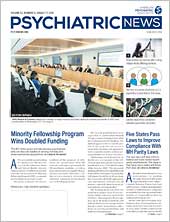As of this past May, over 400 clinicians—including solo practitioners, members of group practices, and physicians in large health systems—were fully integrated into PsychPRO, APA’s new mental health registry.
That surpasses the number of participants who were expected to join when the registry was created by more than 100 percent. APA also worked to get the new registry approved as a Centers for Medicare and Medicaid Services (CMS) Qualified Clinical Data Registry (QCDR) a year ahead of schedule.
“By getting this cutting-edge technology built expeditiously to achieve QCDR certification one year ahead of schedule, the registry was able to help participants who were integrated into PsychPRO to avoid a penalty, and most scored high enough to be eligible for bonuses under the Merit-Based Incentive Payment System [MIPS],” said APA CEO and Medical Director Saul Levin, M.D., M.P.A.
PsychPRO (Psychiatric Patient Registry Online) was launched in May 2017 to help members achieve the following:
•
Avoid payment penalties and earn bonuses for meeting quality reporting requirements while minimizing the burden of data collection.
•
Achieve optimal patient outcomes through tools to measure, chart, and benchmark clinical care.
•
Automatically obtain MOC Part IV credit for quality improvement.
•
Develop better ways to treat and prevent psychiatric illnesses and help the field of psychiatry develop and test its own quality measures.
MIPS began with the 2017 performance year, and the first payment adjustments will be in 2019. There are four MIPS performance categories: quality, advancing care information, cost, and improvement activities.
A total MIPS score of 70 or greater qualified a practice to receive possible bonus money on its 2019 Medicare reimbursements. Not reporting anything at all meant a practice would receive a 4 percent penalty. (For an overview of the Quality Payment System, go to
APA’s Payment Reform Toolkit.
Because the MIPS program was in its first year, CMS allowed practices to submit a minimum of one quality measure or one improvement activity to avoid the penalty. Many PsychPRO participants, ranging from solo practitioners to large hospital systems, did far better than this by meeting full CMS requirements and scoring 70 or greater out of a total score of 100. Four practices achieved a score of 100.
APA members who have used the registry for reporting say PsychPRO is a game changer. David Brodie, M.D., of New York called the registry “one of the best member benefits that APA has ever offered.” Alvaro Camacho, M.D., who practices with a small Federally Qualified Health Center in the San Diego area, said, “PsychPRO has been an invaluable resource for reporting our outcomes.”
Richard Ownings, M.D., a practitioner with Psychiatric Associates of Arkansas, concurred. “I enthusiastically endorse the PsychPRO program. I had actually given up on succeeding at MIPS, because the undertaking seems too onerous. … I can see how the PsychPRO interface will enable collection of the data that we need in order to report. I very much appreciate APA creating this solution for me and the other busy practitioners.” ■
If you wish to sign up for the registry to meet the 2018 reporting requirements, you must do so by October 1. For more information, go to
psychiatry.org/registry.

